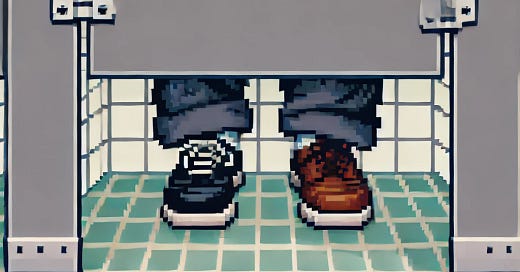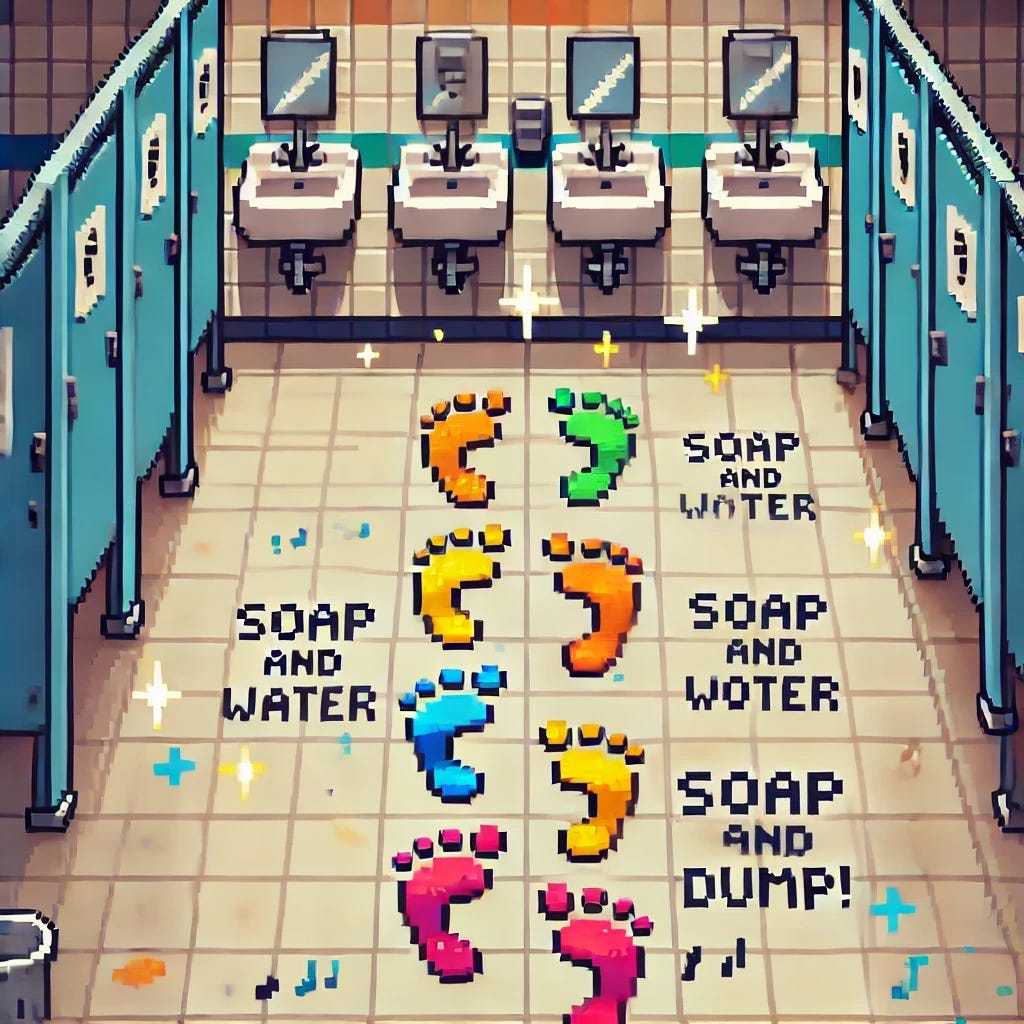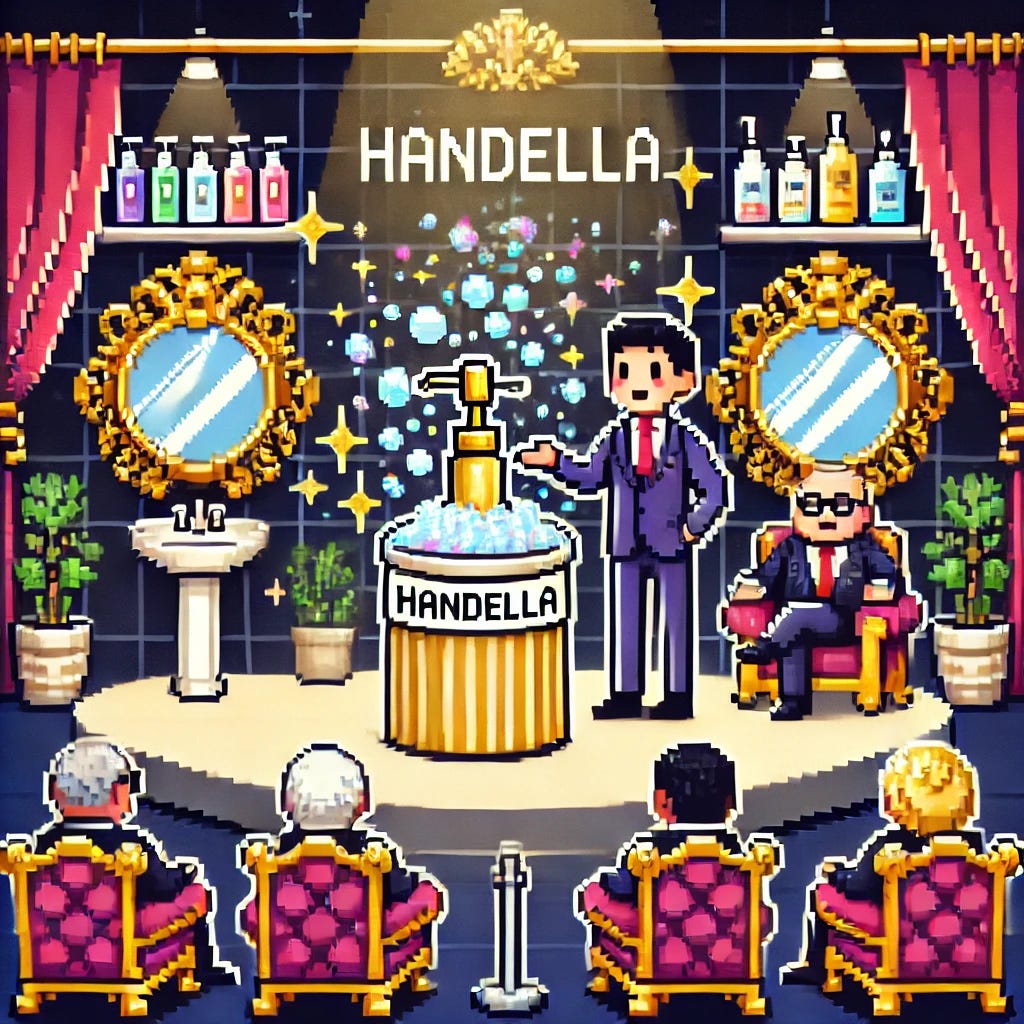First of all I wasn't going to post this today, but I'm not feeling too great right now, I'm coming down with something so it feels appropriate.
“Dirty bastard!”
Most of us have been there at one point or another. I tend to try not to, but there are occasions when it has to be done.
I'm talking about public toilets, bathrooms, water closets, loos, bogs, pottys, little boys rooms, khazi, il vaso, the dunny, the head, the lavvy, the can, the little house on the prairie.
There I am, sat in stall 4, it's the biggest, more room to manoeuvre, when the door clangs open and someone else walks in, into the bathroom, not my stall! They walk in my direction, then they audibly sigh because "Trap 4" already has a dog in it, and they enter 1 or 2. I sit there not able to conclude my business until the other chap has concluded his.
Crazy as it might be, I suffer from "stage fright" when sat in a stall, I'd rather not have anyone else hear the noises my bottom trumpet makes.
So I'm scrolling on my phone and can't help but notice that the chap in the other stall has no such fears. Noisily taking care of business, the package is delivered, the kids are dropped off, maybe a quick wipe, a polish and the toilet is flushed, zips are zipped up and out he goes.
I expect the next sound I hear to be running water and then the hand drier, but the next sound I hear is the door opening and closing again.
“Diiiiiirty fucking bastard!”
I feel the need to say that I haven't always been one to wash my hands after using “The Oval Throne” and it reminded me of a time in Junior School (5-11 years old,) in England when the teacher, ahead of her time I'm sure, would only allow you to go to the toilet after marking both hands with a felt tip pen. A little mark on the palm of one hand and the back of the other. Only after both hands were marked could you jet off to the “john”. This also served as a hall pass, should you be stopped by another teacher en route to the “room of reflection”.
The idea being you couldn't come back into the lesson until the marks were gone, proving you had indeed washed your hands. It worked quite well, I'm not sure it would work in this modern world, someone somewhere would complain ,but in my school it worked, but only went during a lesson.
At lunch time they had actual dinner ladies stood outside of the boys toilets (not the girls!) and they physically checked that your hands were wet before allowing you to go and eat. That's right you could wash your hands but you couldn't dry them properly, or you had to go do it again.
That set my curiosity tingling. What would work in public loo’s to encourage hand washing? What would work to ensure that Gavin from HR wasn't spreading the love to every surface he touched after cleaning his crevice.
1. Interactive Mirrors with Augmented Reality:
How it works: Install smart mirrors that display digital overlays when someone approaches. The mirror could show virtual germs (or worse for repeat offenders) on the person's hands or face that "wash away" after they've used soap and water. Using facial recognition a scoreboard could also appear telling you how well you've done.
Why it works: This visual and interactive element makes the invisible (germs) visible, reinforcing the importance of handwashing in a memorable way. The scoreboard element could introduce a little bit of public shaming and gamification of simply being clean.
Is it plausible?: Not really, it would cost thousands for the set up and there would be massive privacy concerns of cameras in the bathrooms.
2. Gamify Handwashing:
How it works: On the subject of gamification, implement touchless soap dispensers and faucets equipped with sensors that track usage. Display a leader board outside the restroom showing which departments or teams have the highest handwashing rates… and which have the lowest. There could even be a prize for the teams of individuals who do the best.
Why it works: Friendly competition motivates people. Gamification turns a mundane task into an engaging activity.
Is it plausible?: Again, not really, tracking bathroom usage is very big brother and recording and rewarding restroom routines might also be frowned upon… by Gavin from HR if nobody else.
3. Footstep Decals Leading to Sinks:
How it works: Place brightly coloured footprints on the floor leading from the stalls to the sinks. The path can include funny or thought-provoking messages.
"Soap and water, give them a pump, keep your hands clean after a dump."
If the magical footsteps could play notes from a song as you step on them that might be an added bit of encouragement for people to step on them all. With the notes from each stall playing a different soundbite, which could be changed regularly to keep people guessing.
Why it works: Visual cues subtly guide behaviour without overt instructions.
Is it plausible?: Yes, at least for just the decals, its a cheap and easy thing to install and at least initially until people become habituated to them where the effectiveness might decrease. Adding in the jingle playing floor piano style footprints may be less plausible.
4. Musical Handwashing Stations:
How it works: Sticking with the musical theme, installing devices that play a popular 20-second chorus when the soap dispenser or faucet is used. Change the song periodically to keep it interesting. Multiple washes on separate sinks could keep the party going. Songs that could be used: Let it Flow - Frozen, Don't Stop Relievin' - Journey, Push It - Salt n Pepa, Shake It Off - Taylor Swift
Why it works: Music makes the handwashing duration enjoyable and ensures people wash for the recommended time.
Is it plausible?: Yes, it could be one of the most plausible answers on the list, fairly easy to implement into the bathroom and wouldn't cost the earth.
5. Custom Soap Scents and Dispensers:
How it works: Offer a selection of pleasant, unique soap scents in creatively designed dispensers that spark curiosity. I'm talking Citrus Safari - Blood Orange, Lemon Grass and a hint of sandlewood, adventurous freshness that will leave you feeling extra clean. or Vanilla Bean Daydream - Vanilla, almond and honey, comforting and dreamy, this scent will make you think you've ordered desert at your favourite restaurant.
If the scents are swapped out often enough it will have people sprinting to the sink to indulge in that public toilet spa experience.
Why it works: An attractive scent and fun dispenser can entice people to use the soap. It's also been shown that despite not being as good at actually cleaning hands, foam soap over both liquid and hand soap is actually the more attractive choice for handwashing, probably due to the fact its novel, it's also cheaper as its mostly air!
Is it plausable? Yes it is. This is the easiest and probably most effective one on the list and I'm already drafting up the pitch for Dragons Den / Shark Tank
The Pitch:
Dragon's / Shark's, I present to you... Handella.
A revolutionary handwashing experience that turns ordinary public toilets into five-star retreats. Handella is more than just soap, it's a sensory journey that makes cleanliness a pleasure rather than a chore.
We’ve combined irresistible fragrances with psychological triggers to drive a change in behaviour, encouraging handwashing like never before. It’s a well-known fact that public restrooms are notorious for poor hygiene compliance, but Handella is here to change that. Imagine public toilets across the country no longer being avoided but actively sought after because they offer an experience akin to a luxury boutique.
Our Mission? Transform the mundane act of washing hands into a highlight of the day, ensuring public health gets the boost it needs.
For just £5,000,000 I'm offering you a massive 10% of my not yet existing business. Who want's to try a sample?
6. "Germ Vision" UV Lighting:
How it works: Set up a UV light area near the sinks where people can see glowing representations of germs on their hands before washing. Sure, it wouldn't show up actual germs, but skin oils, dirt etc. might show up quite well.
Why it works: Visualizing germs can prompt immediate action to wash hands. But it still relies on the novelty of the UV light to "see" them.
Is it plausible?: It's just a novelty really, it would quickly wear off.
7. Interactive Wall Art:
How it works: Install murals or artwork that change or reveal hidden images when viewed from different angles or when certain lights are activated after handwashing. Daily comic strips at the sinks or sports news? Where's Wally/Waldo, spot the difference panels, the possibilities are endless.
Why it works: It creates a sense of curiosity and reward for those who engage in handwashing.
Is it Plausible? Yes, the displays could also be used for creative advertising, subsidising the cost.
8. "Dirty Hands" Door Handles:
How it works: Install door handles that feel sticky or have a texture when touched by unwashed hands (using harmless, residue-free technology). After washing, the handle feels normal.
Why it works: Immediate tactile feedback can encourage handwashing before leaving.
Is it plausible? I'm not sure, I made the substance that would be applied to the door handles up. So probably not.
9. Install Handwashing Trivia Screens:
How it works: Place screens above sinks that display, trivia questions. The answers are only revealed after the taps have been ran.
Why it works: Provides entertainment and information, making the handwashing time feel shorter and more engaging.
Plausable? Yes I think so, display screens and some kind of switch in the taps. Again adverts could be shown on the screens to subsidise costs. I could see this being a winner in pubs.
10. Soap Dispensers with Random Rewards:
How it works: Occasionally, using the soap dispenser triggers a small reward, like a voucher for a free coffee or snack.
Why it works: The element of surprise and potential reward encourages consistent use.
Plausible? Yes, this is probably one of the easiest, but there is always the potential for abuse. Perhaps the prize would be time limited, or linked to the door opening so if people really wanted to game the system they would have to enter and exit the loos multiple times before hitting the soap dispenser.
11. Humorous or Thought-Provoking Signage:
How it works: Use creative posters with jokes, puns, or interesting facts about hygiene. Example: "Didn't wash your hands? You might as well be shaking hands with Gavin from HR's penis!"
Why it works: Humour can be an effective tool to make messages stick.
Plausible? I think I've gone too far. Humorous signage might be good for a laugh, but would it really trigger a hand wash?
12. Infrared "Clean Hands" Checks:
How it works: Install an infrared scanner that shows the temperature difference between clean and dirty hands, visible on a screen as people exit.
Why it works: Provides immediate visual feedback without being invasive. Cameras show heat only.
Plausible? Assuming people use the hot tap, then potentially. FLIR camera's are not that expensive anymore and a display to show the camera feed wouldn't be too expensive either.
I think I’m done. Weird and wonderful, plausible and definitely not plausible, which one is your favourite? Do you have any others that might work?
Implementing these ideas can make handwashing an engaging and memorable part of the day rather than a chore. The key is to create an environment that subtly influences behaviour through positive reinforcement, sensory engagement, and even a bit of fun.
Got a brilliant idea for handwashing innovation, or just a dirty toilet story of your own? Drop it in the comments (metaphorically, please). And don’t forget to subscribe, let’s clean up the world one chuckle at a time.








I once sat in a stall next to a very talkative dude who kept a running commentary going, interspersed with grunts and sighs of relief. Midway through this performance came not the final flush but a loudly announced “courtesy flush!”
My wife and I had guests round one night and before they arrived I was cleaning up the spare bathroom. The scent was whisky and vanilla or something to that effect. Once I noticed it I said I wonder if there is a social utility in scented soaps. In that when someone emerges from the bathroom they can remark on the scent implying that they washing of the hands was done by default. Rather than announcing "Hey I washed my hands". This seems a little more dignified.